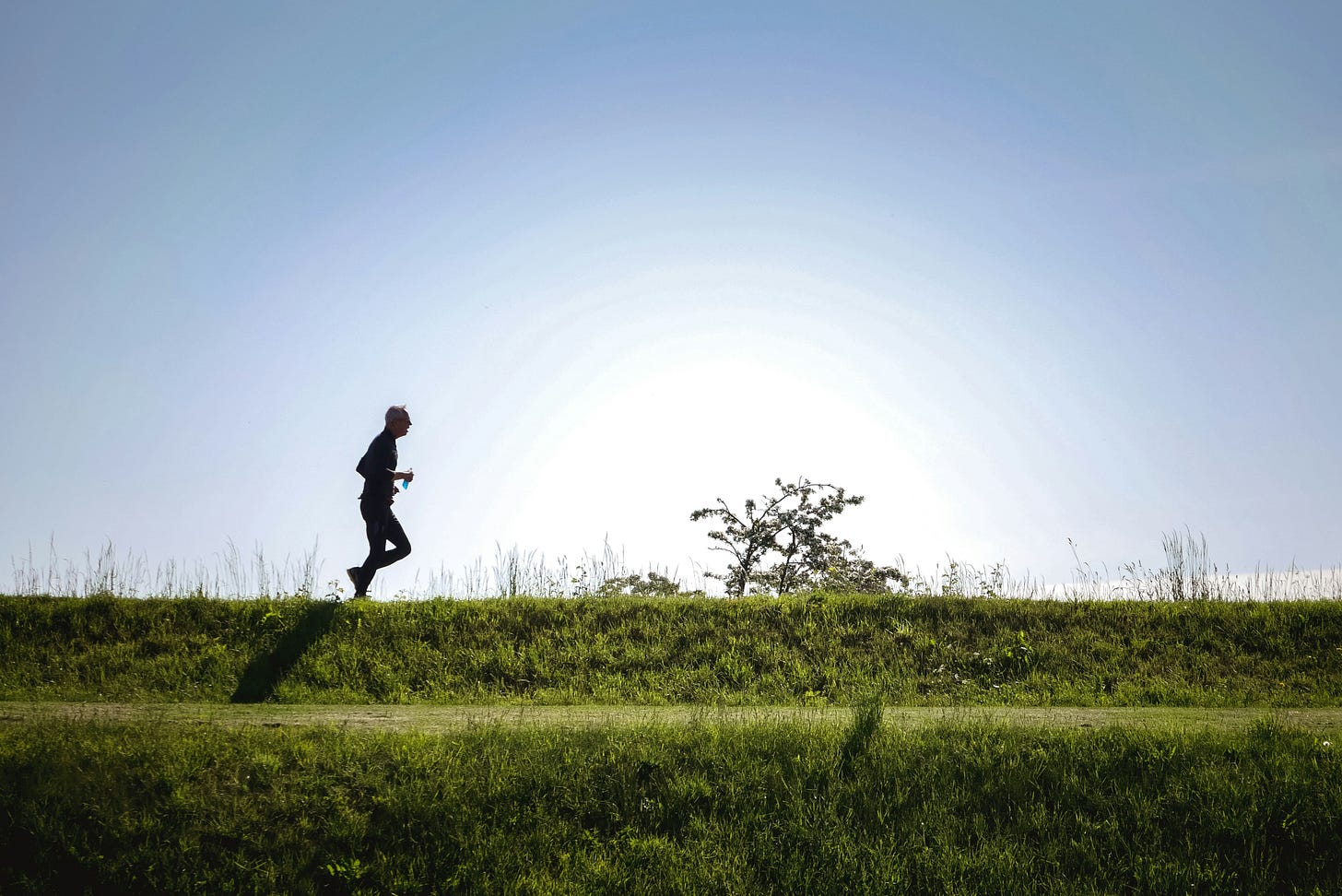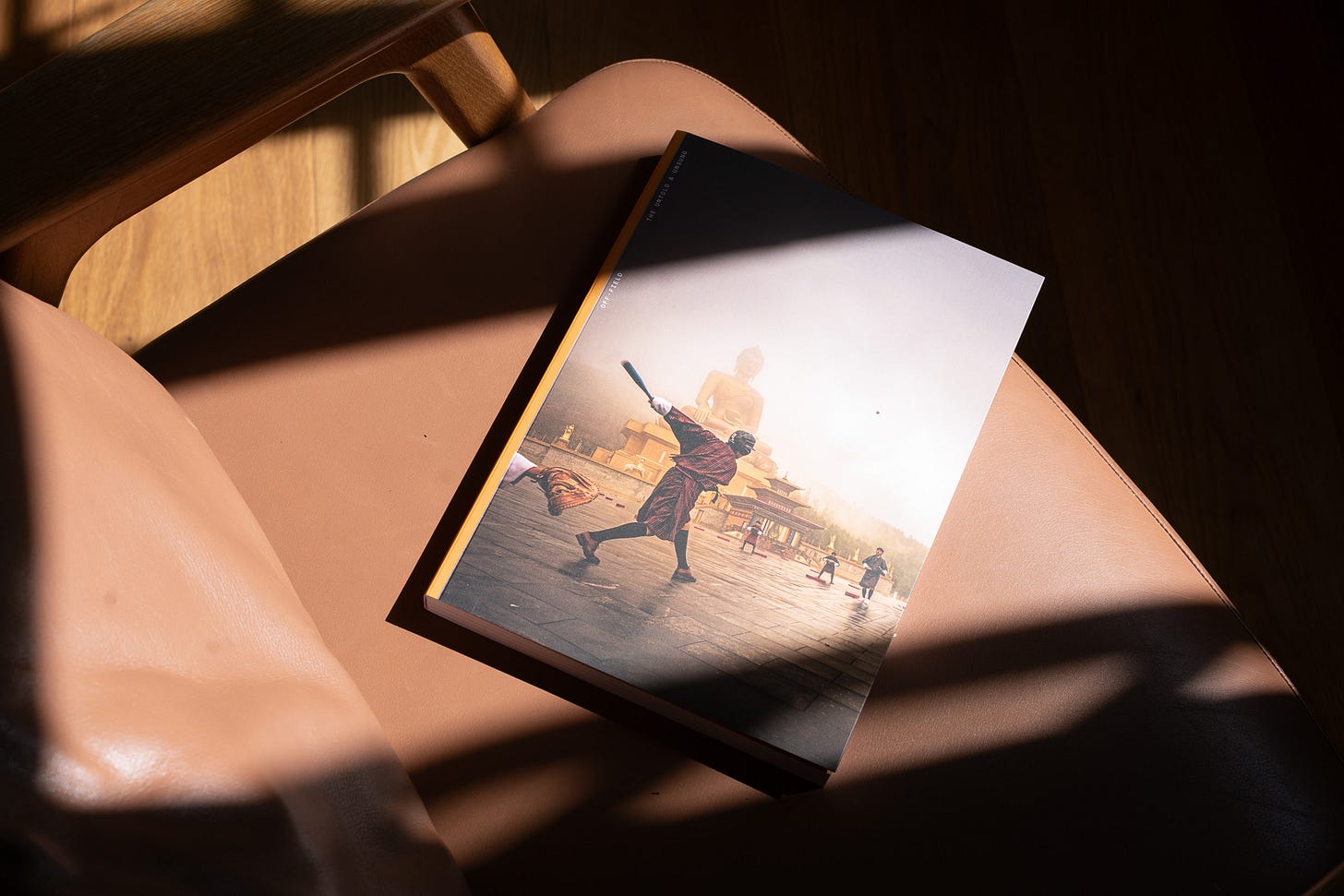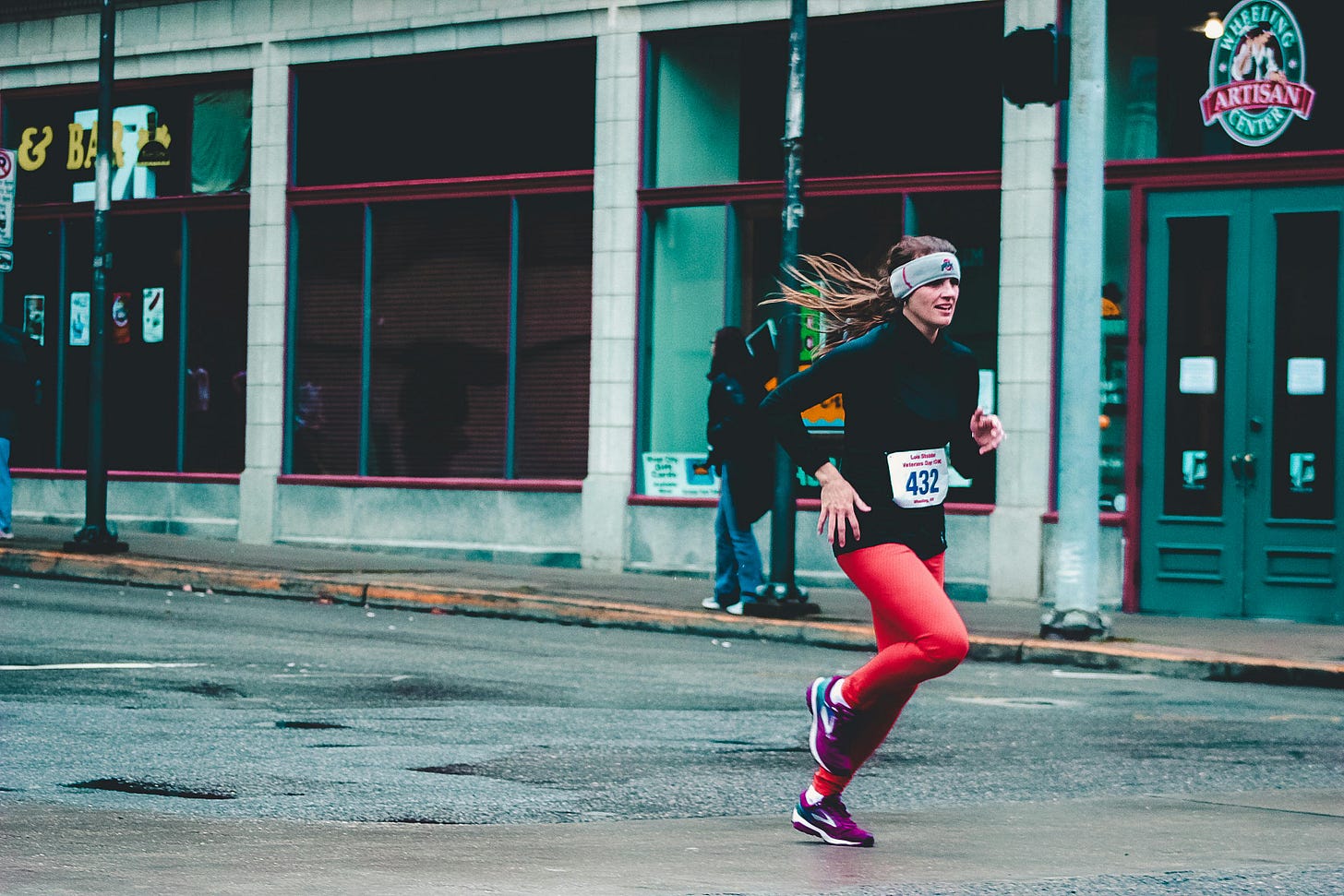The quiet comeback of pure sport
#22: Strava detoxes, Augusta phone bans, duels of honour, the dread of DNFs, and Schrödinger’s PB...

Tales from the fringes of sport and society…
I did something insane this month. Incomprehensible. Inexcusable. Incredible. I went for a run, without my Fitbit.
It certainly wasn’t planned. Having mentally manoeuvred myself into the headspace to get my knees up, I whipped on some shorts, tee’d up a podcast, and tied my running shoes. The sky was blue, the air was mild, the conditions were perfect. I felt fully charged and ready to go.
Which was more than could be said for the digital double act that usually accompanies me on a jog. As I opened the front door, I noticed in horror that my watch harboured a meagre 7% of remaining battery. My iPhone, meanwhile, was limping on with just 11%. These lemons were well and truly squeezed.
It presented an unexpected dilemma. Postpone and recharge, or go without? I told myself the latter was pointless. Right? Never mind whether trees falling in deserted forests make any sound, life’s true quandary is whether calories really burn if Strava doesn’t GPS your sorry arse to confirm it.
But then the insane thing happened. I said sod it, I’ll go anyway. And so I did.
The result was that my run was - steel yourselves - untracked. There is no record of my time, distance, pace, or heart rate. I have no idea if I did two miles or seven, whether I was gone for 20 minutes or an hour. A Schrödinger’s PB.
But what I do recall was a sense of something novel. A refreshing throwback: a run for running’s sake. Sport at its most elemental.
I reasoned it must be the spring air. Because the more I considered the events of April, the more I encountered evidence of sport’s fundamental draw. A core magnetism that pre-dates algorithms and the attention economy.
At the Masters in Augusta, thousands of patrons gushed at the sight of Rory McIlroy etching his name in the history books with a win that secured his torturous and mesmerising career grand slam. But what stood out among those on the course watching in awe, was that each witnessed it without their glass-encased middleman.
Augusta, in an act of subtle rebellion, upholds a ban on mobile phones and electronic devices. Want to make a call? Use the pay phones. Want to take a picture? Trust the pros from Getty to do it better. Want to post on Instagram? Do it tomorrow. Ask those in attendance if they missed out by not having their black mirror to hand.
To the Tottenham Hotspur Stadium on Saturday, where two bitter rivals fought not for belts, but for something much harder to define. Boxers Conor Benn and Chris Eubank Jnr have found their legendary fathers' shadows so inescapable that they’ve resigned themselves to duelling in the dark.
So jarring was it to see such hereditary hate, a rivalry passed down like an old family recipe, that it would take the opening bell for most of us to realise that it was real. Whatever they were fighting for - pride, closure, a dad’s approval - there was a raw and naive purity to their epic scrap. One that will surely reward them with a sequel.
Then, in the same city a day later, the London Marathon became the world’s largest, with 56,640 finishers pipping New York’s record by a thousand. That’s thanks to a 105% increase in runners aged between 20-29. It seems the TikTok generation are escaping the prison of infinite scroll, swapping the veneer of digital communities for the endorphin-charged rhythms of a thousand footsteps.
In an era of curated identities and performative hustle, the marathon’s growing appeal hints at a hunger for authenticity.
In this month’s Off-Field newsletter, you’ll find brilliant stories on the essence of sport for sport’s sake. Read about adaptive skiing in Turin, overcoming the torment of a marathon DNF, grassroots baseball in Bhutan, and the remarkable Tarahumara - the Indigenous people of Mexico who’ve never needed a watch or a phone to get moving.
For them, running is not a performance nor a competition. It is a form of joy, community, and spiritual connection. They run not for medals or records, but because it makes them feel alive. A reminder that the purest form of sport requires nothing but the will to move.
Enjoy the selection.

Diamonds in the Dragon Kingdom: Off-Field Vol #1
Bhutan is a remote and landlocked country with emerald-green valleys, terraced rice fields, and ancient monasteries that cling to cliffs. Its rugged terrain has made natural athletes of its youth. So when Matthew DeSantis arrived from Connecticut with a bat and ball and a determination to play baseball in the world’s last Shangri-La, he unearthed a new generation of ball players daring to dream in the Dragon Kingdom.
Our cover story in the forthcoming print edition of Off-Field is an amazing tale of an unlikely sporting odyssey in the Himalayas. Over there, thousands of Bhutanese kids have been drawn to an alien pastime not because of YouTube clips, athlete endorsements, video games, or school programmes. But because of something more real. As MLB journalist Michael Clair told us:
“The Bhutanese kids haven’t seen a professional game, they don’t have MLB TV. So their love of baseball is from putting a bat and a ball in their hands and getting them to play. The game sells itself. Matthew, Karma, and Ramon weren’t doing this to get famous or get money. It’s because they love baseball and they wanted to see if anybody else would enjoy it. Fortunately, a lot of people do.”
Many thanks to those who’ve already pre-ordered a copy, your support is much appreciated. We’re in the final stages of production and we can’t wait for you to have it in your hands. You can find out more or order a copy below.

Unsung live at the Morpeth Book Festival
Regular subscribers will know that I made my book festival debut last month, recording a live (gulp) episode of the Unsung podcast as part of the 2025 Morpeth Book Festival.
Titled Not All Heroes Wear Kits, the talk was a whistlestop tour through some of the characters featured in my work. It included tales from British Lions rugby medic Dr James Robson - who described saving Thom Evans’ life on the Millennium Stadium pitch - and Haas F1 chief mechanic Matthew Scott, who was in the thick of the 2020 Bahrain Grand Prix when Romain Grosjean’s car burst into a ball of flames.
“The car had been converted to component pieces. It was one of the worst things I've ever seen. The batteries are anything from 600 to 800 volts and at the start of the race, they're fully charged. They're lethal anyway, but the battery had split open. It was hanging there, sizzling away. Someone had to take the responsibility of cutting through those battery cables. I thought, ‘I suppose I've got to have a go at this.’ I was stood in all this protective gear and I went to cut the wires. I didn’t know what was going to happen.”
And, like a pound shop Marvel villain, there was also a little bit of backstory about why I got into telling these unsung stories from outside the mainstream. If that’s not enough to entice you, it includes some shameless name-dropping from occasions when I interviewed Michael Owen and Gary Lineker. Spoiler alert: I managed to piss both of them off. You can listen below.

Unfinished business
Glorious
“The first time I ran the London Marathon, I didn’t finish. Not because I was injured, not because I was heroically sacrificing my body for charity, but because I simply couldn’t be arsed to carry on. Somewhere around mile 19, just after a bloke in a rhino costume overtook me for the third time, my legs folded, my will evaporated, and I cried in front of a very kind St John Ambulance volunteer who looked about 17 and very unsure about how to handle a grown woman sobbing uncontrollably into a foil blanket.”

Remember public phones? The Masters still offers old-school devices as alternative to cellphones
AP News
“While not having a cellphone is an inconvenience for some, others have come to relish the liberating feeling of being disconnected from the world for a little while. Fletcher Lord from Little Rock texted his wife after he arrived at the course around 6 a.m. and reminded her not to expect to hear from him all day. He then set out to enjoy a few refreshments on a sunny, 70-degree day amid the serene backdrop of blooming azaleas and tall pines. ‘Once you get over the anxiety of not having your phone, it’s a very freeing feeling because it forces you to just be here in the moment,’ Lord said.”
How The Observer got London up and running
The Observer
“Fittingly, it was the unexpected wonderment of a trip to the Big Apple in 1979 that planted the seed from which an extraordinary history has sprung. By that stage, Brasher had reinvented himself an acclaimed businessman and respected journalist for The Observer when, somewhat inebriated, he was persuaded to take on the challenge of running the New York Marathon. He returned inspired.”

The man behind a champion: Anthony Hamilton
Culture of Sport
“The cameras didn’t catch it for long, but it was one of the most powerful moments of the Australian Grand Prix. As Isack Hadjar stood shattered in the paddock, his F1 debut wrecked before it truly began, Anthony Hamilton stepped forward. Quietly, without fanfare, he wrapped an arm around the young rookie driver, offering comfort that went beyond words.”

A small, great revolution: Samuele and Michal take to the slopes
BBC Sport
“A touching moment on the slopes at the Special Olympics World Winter Games as two adaptive skiers, Michal Dolinsky from Slovakia and Italy's Samuele Tron, are guided down the piste by their fathers. Samuele's father Andrea Tron said ‘playing with him is almost impossible, but on the snow there is sharing. This is a small, but great revolution’.”
Born to Run
Christopher McDougall
“That was the real secret of the Tarahumara: they'd never forgotten what it felt like to love running. They remembered that running was mankind's first fine art, our original act of inspired creation. Way before we were scratching pictures on caves or beating rhythms on hollow trees, we were perfecting the art of combining our breath and mind and muscles into fluid self-propulsion over wild terrain. And when our ancestors finally did make their first cave paintings, what were the first designs? A downward slash, lightning bolts through the bottom and middle - behold, the Running Man.”
In Born to Run, journalist Christopher McDougall sets off with a simple question: Why does my foot hurt? The answer takes him far from conventional sports science and deep into the copper canyons of Mexico’s Sierra Madre, where he meets the Tarahumara, a reclusive Indigenous people known for their almost mythical ability to run hundreds of miles without rest, injury, or modern gear.
What unfolds is more than a book about running. It’s a story of human potential, of rediscovering something instinctive. And today, as record numbers sign up to marathons all over the world, it's heartening to see a new generation embracing the ancient human magnetism behind the activity.
And while you might not want to follow the Tarahumara in running without footwear, it might just inspire you to give it a go without a Fitbit. See if you can get your own Schrödinger’s PB.
Thanks for reading April’s edition of Off-Field. If you enjoyed it, use the buttons below to like the newsletter, post a comment, or share it with others.
You can get in touch at hello@off-field.net
Read previous editions of Off-Field at offfield.substack.com/archive
Subscribe free for future editions of Off-Field, or share it with a friend:
“I just run. I run in void. Or maybe I should put it the other way: I run in order to acquire a void.” - Haruki Murakami











